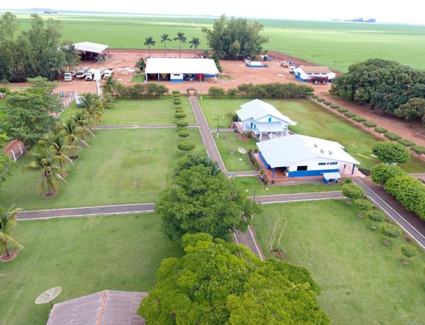Soybeans grown with the future in mind
The 3S program gives farmers in Brazil training and resources to operate more sustainably
February 21, 2019
Image above: The Rehders family camped and stayed in the cabin pictured at top left for 30 days while marking their farm’s property boundaries; 41 years later, at right you see their farmhouse today.
To Guilherme José Rehder, sustainability simply makes sense. The 74-year-old farmer has spent his career building his family’s farming operations in a way that has looked to the future: protecting natural resources and empowering his employees to achieve more.
“Sustainability, in my opinion, is when you produce with quality, respecting and improving the environment,” he said, going on to add that it also includes “not only respecting the labor laws but also encouraging employees to improve the quality of life of their children and grandchildren.”
This mindset is also at the core of the 3S (Sustainably Sourced & Supplied) soybean certification program. Started by Cargill, it is independently verified and works with about 200 farming operations across some of Brazil’s largest soybean-growing regions.
Farmers who participate in the program commit to grow their crops with the best agricultural practices, protect the welfare of their workers and manage greenhouse gas emissions through a process of continuous improvement. 3S aligns with several European Union standards and programs such as RTRS, ISCC and others according to the FEFAC sustainability guidelines. It gives farmers practical ways to run their operations responsibly and transparently while addressing the environmental, social and economic dimensions of sustainability.
In exchange for participating, farmers get technical assistance to help them improve their productivity, and their products are more competitive in international markets. It’s just one way that Cargill seeks to positively impact the large and complex supply chains for crops like soybeans, through hands-on work at the farm level.
The core of the program is a set of future-focused values that Cargill and farmers like Rehder share, values that are a main reason Rehder has sold his crops to Cargill for more than 45 years. Over the decades, he has grown his farming business from the modest amount of land he inherited from his father to operations in the states of São Paulo and Goiás.
“During that time, we experienced ups and downs, but we always had faith in the land, our work and the support of our partners, such as Cargill,” he said.
Today, many of his original employees still work for him. Some of their children do, too, while others in the second and third generation have gone off to get degrees in fields ranging from agricultural engineering to dentistry.
Progress across many dimensions
Farmers participating in the 3S program are visited by experts from Instituto BioSistêmico (IBS) a non-profit that specializes in rural development and sustainable agricultural solutions. These technicians help equip the farmers with the best practices to sustainably boost their production.
The Garcia family has been farming near the town of Campo Novo do Parecis in Mato Grosso state since the 1970s, diversifying over time from rice and soybeans into sugarcane, cotton, corn, sunflower and popcorn as well.
Since starting in the 3S program in 2016, their farm has become one of the highest-rated as assessed by the program’s 32 criteria.
“We experienced improvement in the management, with respect to the environmental, social and productive practices, creating a sustainable relationship among all our business activities,” said Diogo Raphael Sordi Garcia. “The 3S program became part of the employees’ everyday lives who felt valued and can even add to their resume that they were part of that growth.”
According to Garcia, the farm has improved its cultivation practices, in addition to measures that protect both workers and the land. Now, as new projects are planned, they are designed based on sustainable practices that also raise yields and lower costs.
“We expect that all these actions, as well as this certification, lead the market to better value certified products, awarding those who care about these actions,” he said.
 The Garcia farm today in Campo Novo do Parecis in Mato Grosso.
The Garcia farm today in Campo Novo do Parecis in Mato Grosso.
